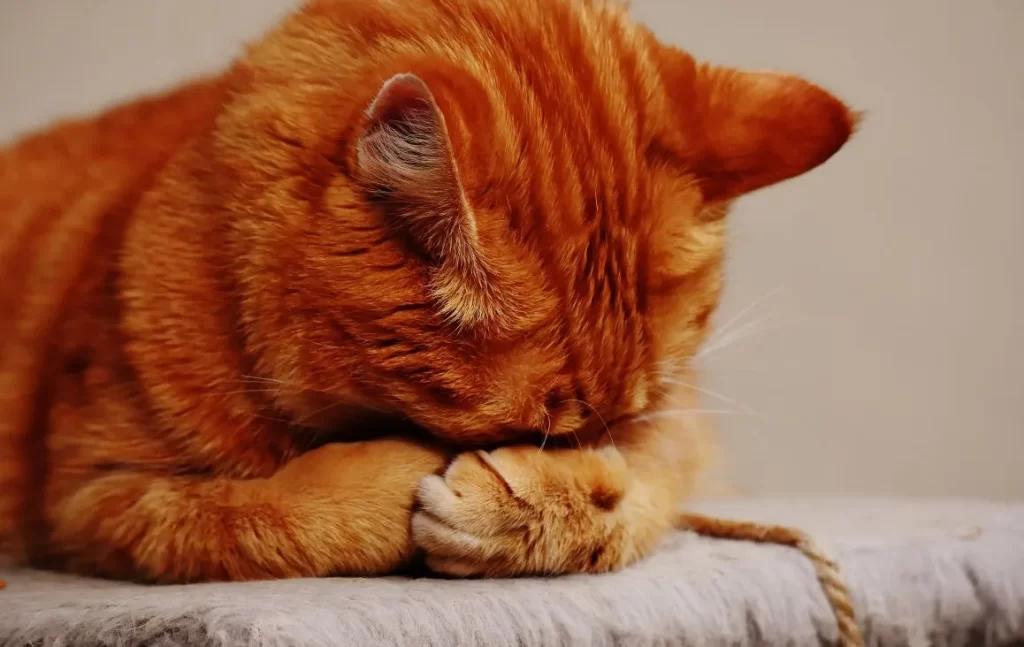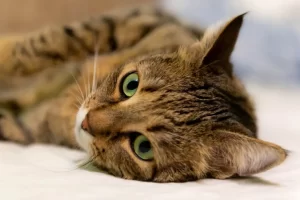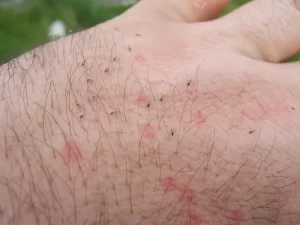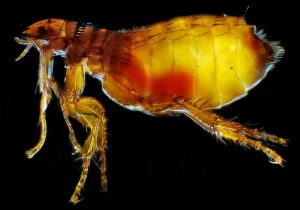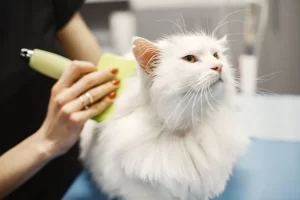Welcome to our comprehensive guide on home remedies for cat swollen anus. As a pet owner, your furry friend’s health and well-being are always a top priority. If you’ve noticed that your cat has a swollen anus, you may be worried and wondering how you can help them feel better. While it’s important to seek veterinary care for persistent or worsening symptoms, there are several home remedies that can offer relief and promote healing. In this article, we will explore various natural remedies, including dietary changes, herbal remedies, hygiene tips, and more, to help your cat find relief from a swollen anus. So, let’s dive in and discover the best natural treatments for your cat’s swollen anus.
If you prefer to listen on-the-go, be sure to check out the audio version of this blog below!
Table of Contents
ToggleWhat is a swollen anus in cats?
A swollen anus in cats refers to an abnormal enlargement or inflammation of the anal area (also known as rectal inflammation). The anus is the opening at the end of the digestive tract through which feces and urine are expelled from the body. Swelling in this area can be caused by a variety of factors, including infections, allergies, injuries, tumors, and digestive disorders. In some cases, the swelling may be accompanied by other symptoms such as itching, pain, redness, discharge, or difficulty passing stools. A swollen anus can be uncomfortable and distressing for a cat and may require veterinary attention to diagnose and treat the underlying cause.
Common causes of a swollen anus in cats
There are several possible causes of a swollen anus in cats, including:
- Anal gland problems: Cats have two anal glands located on either side of the anus, which produce a smelly, oily fluid that is normally expressed during bowel movements. When these glands become blocked, infected, or inflamed, they can cause pain, swelling, and irritation in the anal area.
- Allergies: Cats can develop allergies to various substances, including food, fleas, and environmental allergens. An allergic reaction can cause inflammation and itching around the anus, leading to scratching and further irritation.
- Parasites: Cats can pick up a variety of parasites, such as tapeworms, roundworms, and hookworms, through exposure to contaminated feces or soil. These parasites can cause irritation and inflammation in the digestive tract, including the anus. Help your cat by learning how to naturally deworm cats at home.
- Constipation: When a cat is constipated, the stool can become hard and dry, making it difficult and painful to pass. This can lead to straining, which can cause inflammation and swelling in the anal area.
- Trauma: Cats can suffer from trauma to the anal area due to accidents, fights, or injuries from sharp objects. This can cause bruising, swelling, and pain in the affected area.
- Tumors: While rare, tumors can develop in the anal area of cats, causing swelling and discomfort. These tumors can be benign or malignant and may require surgical intervention.
- Infections: Bacterial, viral, or fungal infections can occur in the anal area of cats, leading to inflammation, redness, and swelling.
Symptoms of a swollen anus in cats
The symptoms of a swollen anus in cats may vary depending on the underlying cause of the swelling. However, here are some common symptoms that may be observed:
- Visible swelling: The most obvious symptom of a swollen anus is a visible enlargement of the area around the anus. This can be accompanied by redness, inflammation, or discharge.
- Pain and discomfort: Cats with a swollen anus may experience pain or discomfort when sitting, walking, or using the litter box. They may also show signs of agitation, restlessness, or lethargy.
- Difficulty passing stools: Cats with a swollen anus may have difficulty passing stools due to pain or inflammation in the anal area. They may strain, cry, or vocalize when trying to defecate. However, if you saw blood in a cat’s stool, this may be because of an underlying disease. In that case, you may want to check out home remedies for blood in cat stool.
- Loss of appetite: Cats with a swollen anus may lose their appetite or refuse to eat due to pain or discomfort. They may also experience nausea, vomiting, or diarrhea.
- Licking or biting the anal area: Cats with a swollen anus may lick, bite, or scratch the anal area in an attempt to relieve the discomfort or itching. This can lead to further irritation and infection.
- Inability to groom properly: Cats with a swollen anus may have difficulty grooming themselves, especially in the anal area. This can lead to matting, clumping, or fecal staining of the fur.
- Behavioral changes: Cats with a swollen anus may exhibit changes in behavior, such as increased aggression, hiding, or avoidance of human interaction.
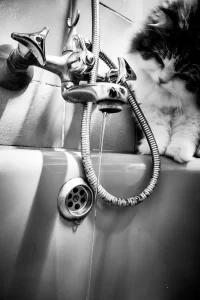
Home remedies for cat swollen anus
While home remedies may provide some relief for a swollen anus in cats, it’s important to consult with a veterinarian to identify and treat the underlying cause of the swelling. Here are some home remedies that may be helpful in managing a swollen anus in cats:
- Warm compress: A warm compress can help to reduce inflammation and relieve pain associated with a swollen anus in cats. To prepare a warm compress, start by preparing a clean, damp towel or washcloth. You can use warm water or add a bit of Epsom salt to the water to help soothe the area. Hold the warm, damp towel or washcloth against the affected area for 5-10 minutes at a time. You can repeat this several times a day as needed. The warmth helps to improve blood circulation and promote healing.
- Epsom salt bath: Epsom salt is known for its anti-inflammatory properties and can help to reduce swelling and relieve pain associated with a swollen anus in cats. To prepare an Epsom salt bath, fill a tub or basin with warm water and add a tablespoon of Epsom salt per gallon of water. Let your cat soak in the bath for 5-10 minutes, then gently dry off with a towel. You can repeat this once a day as needed. The Epsom salt helps to reduce inflammation and promote healing.
- Aloe vera: Aloe vera can be used topically to help soothe and heal a swollen anus in cats. To use aloe vera, start by preparing a fresh aloe vera leaf. Cut off a small piece of the leaf and remove the outer layer to expose the gel inside. Apply a small amount of aloe vera gel to a clean cotton ball or soft cloth. Gently apply the aloe vera gel to the affected area, being careful to avoid getting it in your cat’s eyes or mouth. You can repeat this several times a day as needed. Aloe vera helps to soothe the skin and promote healing.
- Witch hazel: Witch hazel can be applied topically to the affected area to help reduce inflammation and relieve itching associated with a swollen anus in cats. To use witch hazel, start by preparing a clean cotton ball or soft cloth. Apply a small amount of witch hazel to the cotton ball or cloth. Gently apply the witch hazel to the affected area, being careful to avoid getting it in your cat’s eyes or mouth. You can repeat this several times a day as needed. Witch hazel helps to reduce inflammation and relieve itching.
- Coconut oil: Coconut oil can be applied topically to help soothe and heal a swollen anus in cats. To use coconut oil, start by melting a small amount of coconut oil in your hands. Gently apply the oil to the affected area, being careful to avoid getting it in your cat’s eyes or mouth. You can repeat this several times a day as needed. Coconut oil helps to soothe the skin and promote healing. Just make sure to use a coconut oil that is pet friendly.
- Dietary change: A change in diet may help to reduce inflammation and promote healing of a swollen anus in cats. Try feeding your cat a high-fiber diet with plenty of fresh vegetables and lean protein. Avoid feeding your cat processed foods, which can be difficult to digest and may contribute to inflammation. Be sure to consult with your veterinarian before making any changes to your cat’s diet.
- Increased hydration: Ensuring your cat is properly hydrated can help to reduce inflammation and promote healing of a swollen anus. Encourage your cat to drink plenty of fresh water throughout the day, and consider adding wet food to your cat’s diet to increase hydration.
- Chamomile tea: Chamomile tea can be brewed and cooled, then applied to the affected area with a soft cloth to help soothe and reduce inflammation. Chamomile tea contains anti-inflammatory and anti-irritant properties that help to reduce swelling and promote healing. Here is a sample of organic and highly-rated chamomile tea you can find in the market.
- Slippery elm bark: Slippery elm bark like this organic one can be mixed with water to create a paste, then applied topically to the affected area to help reduce inflammation and soothe irritated skin. You can also mix slippery elm bark powder into your cat’s food to help promote digestive health and reduce inflammation.
- Calendula: Calendula can be used topically to help soothe and heal a swollen anus in cats. To use calendula, start by preparing a calendula-infused oil or salve (or you can buy the oil from Amazon). Apply a small amount of the oil or salve to a clean cotton ball or soft cloth. Gently apply the calendula to the affected area, being careful to avoid getting it in your cat’s eyes or mouth. You can repeat this several times a day as needed. Calendula contains anti-inflammatory and antimicrobial properties that help to reduce inflammation and promote healing.
- Petroleum jelly: Petroleum jelly can be applied topically to help protect and soothe the skin around a swollen anus in cats. Apply a small amount of petroleum jelly to a clean cotton ball or soft cloth, and gently apply it to the affected area. You can repeat this several times a day as needed. Petroleum jelly helps to protect the skin and promote healing.
- Apple cider vinegar: Apple cider vinegar can be diluted with water and applied topically to help reduce inflammation and relieve itching associated with a swollen anus in cats. Mix one part apple cider vinegar with two parts water, and apply the solution to a clean cotton ball or soft cloth. Gently apply the solution to the affected area, being careful to avoid getting it in your cat’s eyes or mouth. You can repeat this once a day as needed. Apple cider vinegar contains acetic acid, which helps to reduce inflammation and relieve itching.
Using probiotics as a natural remedy for a swollen anus in cats
Probiotics can be beneficial for cats with a swollen anus, as they help to promote healthy digestion and reduce inflammation. Probiotics are beneficial bacteria that live in the gut and help to maintain a healthy balance of microorganisms. Here are some options and methods for using probiotics:
- Probiotic supplements: Probiotic supplements come in a variety of forms, including capsules, powders, and chews. These supplements (like this highly-rated probiotic supplement) can be mixed into your cat’s food or given directly to your cat. Be sure to follow the recommended dosage instructions on the package.
- Probiotic-rich foods: Some foods are naturally high in probiotics, such as yogurt, kefir, and fermented vegetables. These foods can be added to your cat’s diet to help promote healthy digestion.
- Probiotic enemas: Probiotic enemas can be used to help restore healthy gut bacteria in cats with a swollen anus. To administer a probiotic enema, mix a probiotic supplement with warm water and use a syringe to gently insert the solution into your cat’s rectum. Be sure to use a small amount of solution, and be gentle to avoid causing further discomfort.
When using probiotics, it’s important to start with a small amount and gradually increase the dosage to avoid digestive upset. It’s also important to choose a high-quality probiotic supplement that is specifically formulated for cats.
Herbal remedies for a swollen anus in cats
There are several herbal remedies that can be beneficial for cats with swollen anus. Here are some options and instructions for using herbal remedies:
- Marshmallow root: Marshmallow root can be brewed into a tea (or you can buy it as a powder) and applied topically to help reduce inflammation and soothe irritated skin. To use marshmallow root, start by boiling water and adding the dried herb. Allow the herb to steep for several minutes, then strain the tea and let it cool to room temperature. Apply the cooled tea to a clean cotton ball or soft cloth, and gently apply it to the affected area. You can repeat this several times a day as needed.
- Plantain: Plantain leaves can be used topically to help reduce inflammation and promote healing. To use plantain, start by washing the leaves and crushing them to release the juices. Apply the crushed leaves to a clean cotton ball or soft cloth, and gently apply them to the affected area. You can repeat this several times a day as needed.
- Comfrey: Comfrey can be brewed into a tea and applied topically to help reduce inflammation and promote healing. To use comfrey, start by boiling water and adding the dried herb. Allow the herb to steep for several minutes, then strain the tea and let it cool to room temperature. Apply the cooled tea to a clean cotton ball or soft cloth, and gently apply it to the affected area. You can repeat this several times a day as needed.
- Goldenseal: Goldenseal can be brewed into a tea and applied topically to help reduce inflammation and promote healing. To use goldenseal, start by boiling water and adding the dried herb. Allow the herb to steep for several minutes, then strain the tea and let it cool to room temperature. Apply the cooled tea to a clean cotton ball or soft cloth, and gently apply it to the affected area. You can repeat this several times a day as needed.
When using herbal remedies, it’s important to choose high-quality herbs that are specifically formulated for cats. It’s also important to start with a small amount and gradually increase the dosage to avoid causing further discomfort. If your cat shows any signs of allergic reaction or discomfort, stop using the herbal remedy and consult with your veterinarian.
Maintaining proper hygiene for cats with swollen anus: Tips and techniques
Maintaining good hygiene is important when dealing with a swollen anus in cats, as it can help prevent further irritation and infection. Here are some hygiene tips for caring for a cat with a swollen anus:
- Keep the area clean: Gently clean the affected area with a soft cloth or cotton ball moistened with warm water. Be sure to remove any fecal matter that may be stuck to the fur or skin.
- Trim the fur around the anus: Long hair around the anus can trap fecal matter and irritate the skin, so it’s a good idea to trim the fur in this area. Be sure to use blunt-nosed scissors (like this Japanese one) and be careful not to nick the skin.
- Use unscented, hypoallergenic wipes: You can use unscented, hypoallergenic wipes to help clean the area between baths. Look for wipes that are specifically formulated for cats.
- Use a mild shampoo: If your cat requires a bath, use a mild shampoo that is specifically formulated for cats. Avoid using human shampoos or harsh chemicals, as they can further irritate the skin.
- Use a litter box with low sides: If your cat is having trouble getting in and out of the litter box, it may be helpful to switch to a litter box with lower sides. This can help prevent further irritation and discomfort.
- Use a barrier cream: A barrier cream, such as petroleum jelly or zinc oxide, can help protect the skin around the anus from further irritation. Be sure to apply the cream only to clean, dry skin.
Acupuncture and massage for soothing your cat’s swollen anus
Acupuncture and massage are two holistic therapies that can help alleviate the symptoms of a swollen anus in cats. Here’s a brief overview of each:
- Acupuncture: Acupuncture involves the insertion of fine needles into specific points on the body to stimulate healing and relieve pain. To perform acupuncture on your cat, you’ll need to work with a licensed veterinarian or certified animal acupuncturist who has experience working with cats. They’ll be able to determine the best course of treatment and provide guidance on how to safely perform acupuncture on your cat.
- Massage: Massage can help relieve tension and inflammation around the anus, reducing discomfort and promoting healing. To perform a massage on your cat, start by gently stroking their back and sides to help them relax. Then, use gentle circular motions to massage the area around their anus, being careful not to apply too much pressure or cause further irritation. You can use your fingers or a soft, clean cloth to perform the massage. It’s important to be gentle and patient, as your cat may be sensitive in this area.
Preventive measures for avoiding swollen anus in cats: Tips and advice
Preventing a swollen anus in cats can be done by taking a few simple steps:
- Proper hygiene: Keeping your cat’s anal area clean is essential to preventing swelling and irritation. You can use a damp cloth or unscented baby wipes to clean your cat’s anus after they use the litter box.
- Regular vet check-ups: Regular check-ups with your veterinarian can help identify any underlying health conditions that could contribute to a swollen anus. They can also recommend preventive measures to help keep your cat healthy.
- Proper diet: Feeding your cat a well-balanced, high-quality diet can help prevent digestive issues that can lead to a swollen anus. Make sure to choose a food that’s appropriate for your cat’s age, breed, and health status.
- Plenty of water: Ensuring that your cat is well-hydrated is important for maintaining overall digestive health. Make sure to provide fresh, clean water at all times.
- Litter box maintenance: Keeping your cat’s litter box clean and free of debris can help prevent infection and irritation around the anus.
- Regular exercise: Regular exercise can help improve your cat’s digestion and overall health. Make sure to provide opportunities for your cat to play and explore.
Complications of the untreated swollen anus in cats
If left untreated, a swollen anus in cats can lead to various complications, including:
- Infection: The swollen area can become infected, which can be painful and require medical treatment.
- Anal gland issues: A swollen anus can indicate a problem with your cat’s anal glands. If left untreated, this can lead to abscesses and infection.
- Digestive problems: If the swelling is caused by digestive issues, such as constipation or diarrhea, it can lead to further health complications if not addressed.
- Discomfort and pain: A swollen anus can be very uncomfortable for your cat and cause them pain, which can affect their behavior and quality of life.
- Recurrence: If the underlying cause of the swelling is not addressed, it can recur, leading to chronic health issues.
In some cases, a swollen anus can be a sign of a more serious health condition, such as cancer or inflammatory bowel disease. Therefore, it’s important to seek veterinary care if you notice any signs of swelling or discomfort in your cat’s anal area. Early diagnosis and treatment can help prevent complications and improve your cat’s overall health and well-being.
Read more on How often should I take my cat to the vet?
Conventional treatments for swollen anus in cats: Medications and over-the-counter products
There are several traditional medications, medicines, and over-the-counter products that can be used to treat a swollen anus in cats. However, it’s important to note that you should always consult with your veterinarian before giving your cat any medication, as some can be harmful or even toxic to cats.
Some of the traditional medications that may be used to treat a swollen anus in cats include:
- Steroids: These medications can help reduce inflammation and swelling in the anus. However, they can also have side effects, so they should only be used under the guidance of a veterinarian.
- Antibiotics: If the swelling is caused by an infection, your veterinarian may prescribe antibiotics to help clear the infection.
- Laxatives: If the swelling is caused by constipation, your veterinarian may recommend a laxative to help soften the stool and make it easier for your cat to pass.
- Probiotics: These supplements can help improve your cat’s digestive health and reduce inflammation in the anus.
In addition to traditional medications, there are also several over-the-counter products that may be used to treat a swollen anus in cats, including:
- Ointments and creams: There are several over-the-counter creams and ointments that can be applied to the anus to help reduce inflammation and provide relief.
- Epsom salt: An Epsom salt bath can help soothe the anal area and reduce inflammation.

